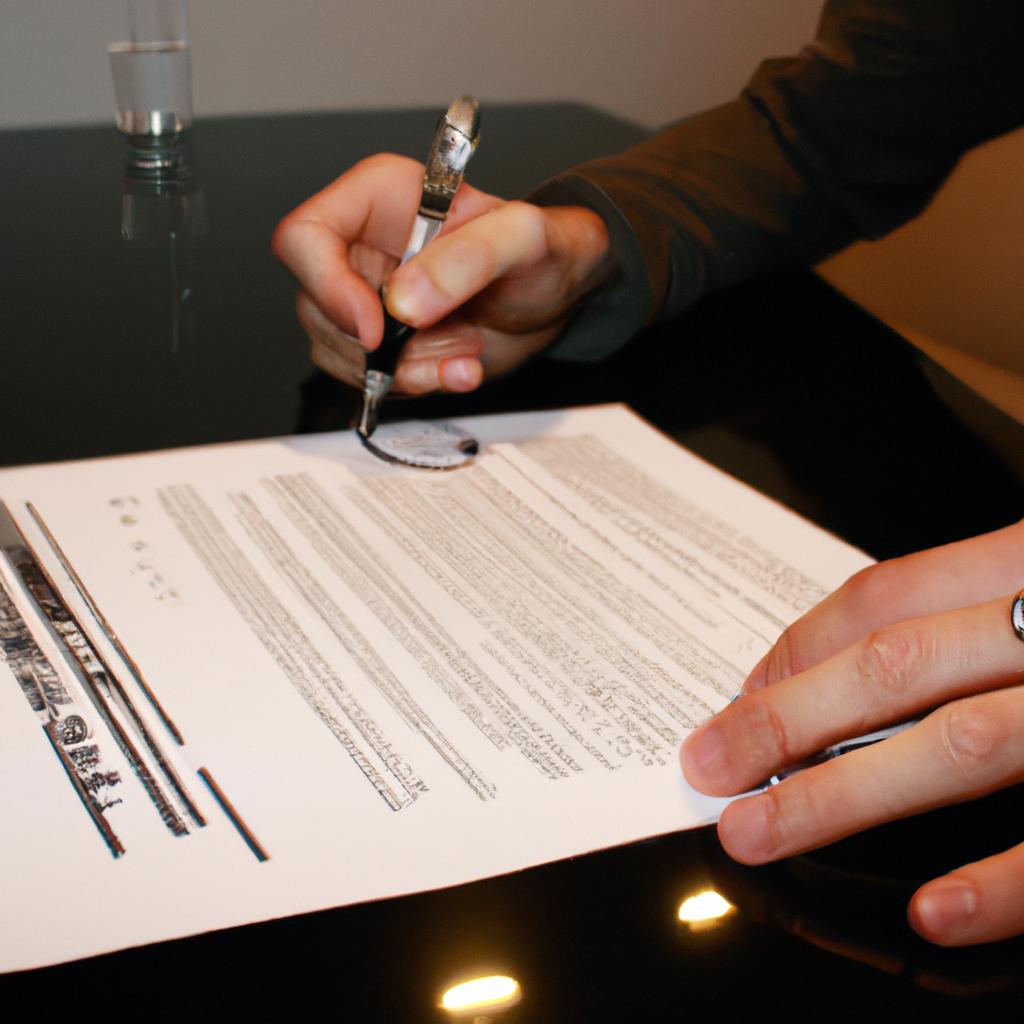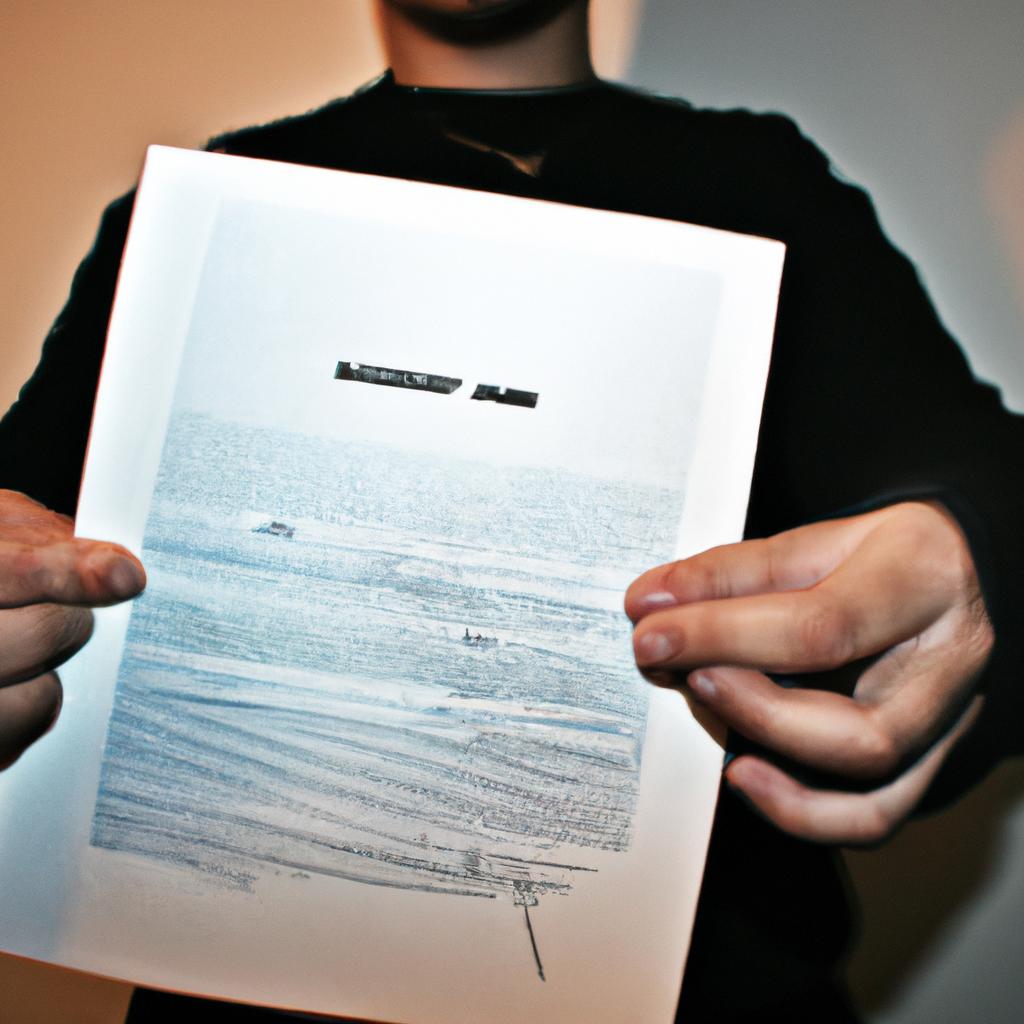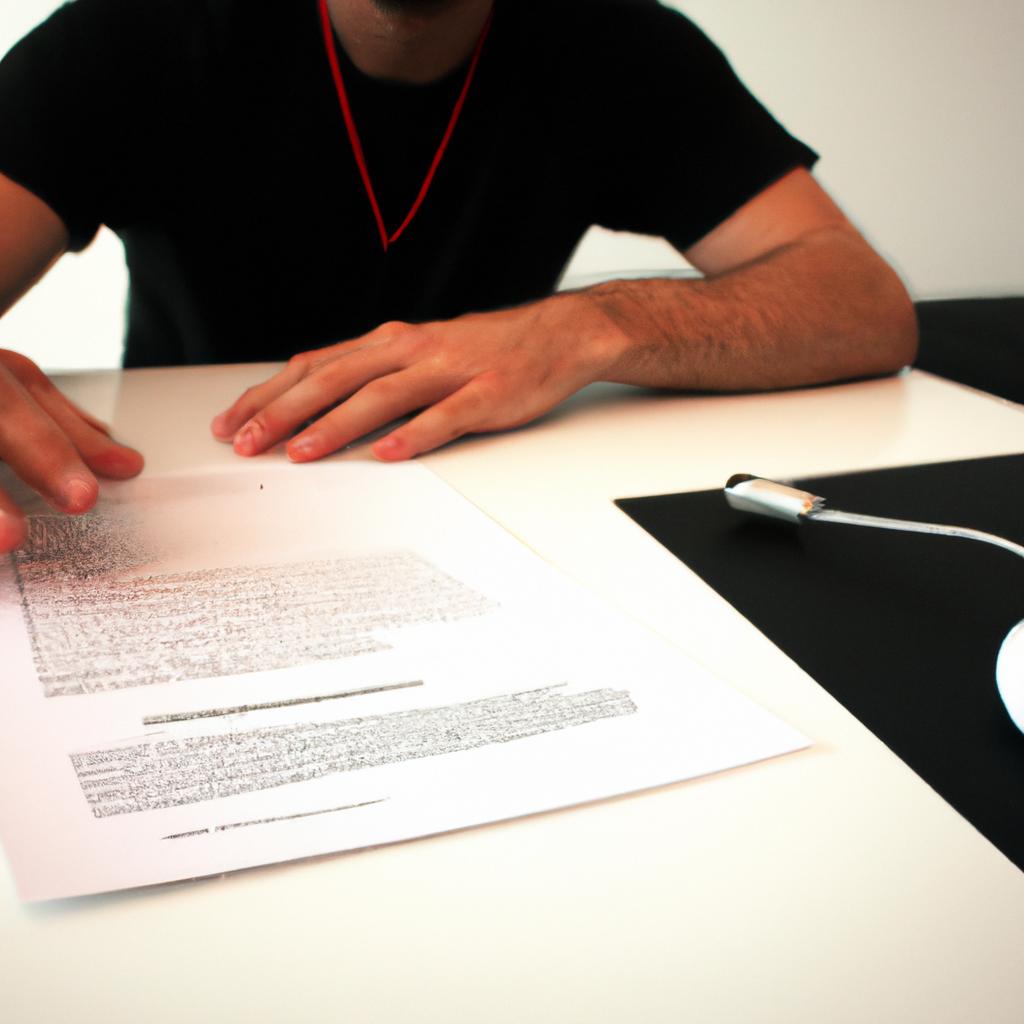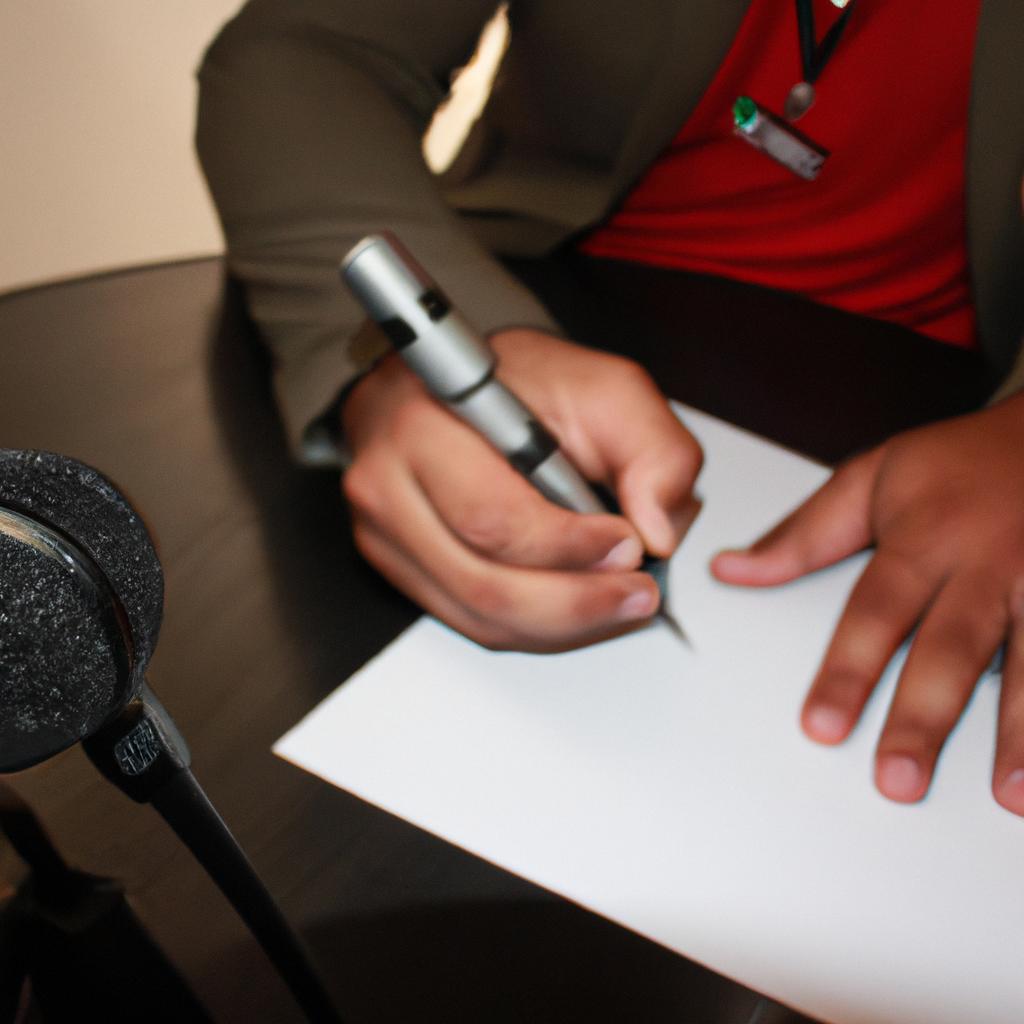Understanding Mechanical Licenses: A Guide to Music Licensing
In the vast landscape of music industry, an essential aspect that often remains overlooked is the intricate world of music licensing. It is a complex terrain where artists, songwriters, and publishers navigate through legal requirements and financial considerations in order to protect their rights and generate revenue from their creative works. To shed light on this topic, this article aims to provide a comprehensive guide to mechanical licenses – one of the most fundamental forms of music licensing.
Imagine a scenario where talented musician Jose Carlos Matos has just finished recording his debut album. Excitement fills the air as he envisions sharing his art with the world. However, before his songs can be released for public consumption, there are crucial steps he must take to ensure compliance with copyright laws and secure fair compensation for his efforts. This is where mechanical licenses come into play. By obtaining these licenses, Matos will have the necessary permission to reproduce and distribute his musical compositions on various formats such as CDs or digital downloads while fulfilling legal obligations towards other parties involved in the creation and distribution process. Nonetheless, delving into the realm of mechanical licenses requires a deep understanding of its intricacies – from determining who needs them to calculating royalties – all of which will be covered in this guide.
First and foremost, it is important to understand who needs a mechanical license. In the context of music licensing, a mechanical license is required when someone wants to reproduce and distribute a copyrighted musical composition that they did not create themselves. This includes cover songs, remixes, and any other form of reproduction or distribution that involves using someone else’s original work.
To obtain a mechanical license, the licensee must reach out to the copyright owner or their representative, typically the music publisher. This can be done directly or through organizations such as The Harry Fox Agency (HFA) in the United States, which acts as a middleman for mechanical licensing. It is worth noting that obtaining a mechanical license can involve negotiating terms such as royalty rates and usage restrictions, so it’s crucial to have clear communication with the copyright owner or their representative.
Once the mechanical license is secured, it is essential to understand how royalties are calculated and paid. Mechanical royalties are typically based on a percentage of revenue generated from each copy sold or reproduced. In the United States, there are statutory rates set by law for physical formats like CDs and vinyl records. As of 2021, these rates stand at 9.1 cents per song or 1.75 cents per minute of playing time, whichever is greater. For digital formats like downloads and streaming services, the rates vary depending on factors such as subscription type and number of streams.
It’s important to note that mechanical licenses specifically cover the reproduction and distribution rights of musical compositions, not sound recordings. Sound recording rights fall under different licenses known as master use licenses or synchronization licenses.
In conclusion, understanding mechanical licenses is vital for anyone involved in reproducing and distributing copyrighted musical compositions. By obtaining these licenses, artists like Jose Carlos Matos can ensure legal compliance while also compensating the original creators for their work. Remembering key aspects such as determining who needs a license, reaching out to copyright owners or their representatives, and understanding royalty calculations will help navigate the complex world of music licensing more effectively.
What is a mechanical license?
Imagine you are an aspiring musician, and after months of hard work, you have recorded your own rendition of a popular song. You decide to release it online, hoping that it will gain some recognition. However, before doing so, there’s an important legal aspect to consider: obtaining a mechanical license.
A mechanical license grants you the right to reproduce and distribute copyrighted musical compositions in audio format. This means that if you want to record and release a cover version or use someone else’s music in your project, you need to secure this license from the copyright holder. It ensures that the original songwriter receives compensation for their work while allowing others to legally use their music.
To better understand the concept of mechanical licenses, let us examine four key points:
- Ownership: A mechanical license acts as proof that you have obtained permission from the copyright owner to reproduce their composition.
- Royalties: When obtaining a mechanical license, you agree on paying royalties—typically based on units sold or streams—to compensate the copyright holder for each copy made or distributed.
- Statutory Rate: In many countries like the United States, there is a statutory rate set by law which determines how much royalty per unit must be paid.
- Digital Rights Management (DRM): Some artists may also require additional DRM restrictions on digital copies of their works to protect against unauthorized distribution.
| Ownership | Royalties | Statutory Rate | DRM |
|---|---|---|---|
| Proof of permission from copyright owner | Compensation based on sales/streams | Set by law in some countries | Additional measures for protection |
Obtaining a mechanical license is crucial whenever you plan to use someone else’s music legally. By adhering to these licensing requirements, both musicians and composers can benefit from fair compensation and ensure proper acknowledgment of artistic contributions.
Now that we understand what a mechanical license entails, let’s explore when you might need one in the next section.
When do you need a mechanical license?
Understanding Mechanical Licenses: A Guide to Music Licensing for Jose Carlos Matos
What is a mechanical license? In the previous section, we explored the concept of a mechanical license and its significance in the music industry. Now, let us delve deeper into understanding when you need a mechanical license.
Imagine this scenario: You are an aspiring musician named Sarah who has written a heartfelt song that you believe has great potential. After tirelessly perfecting your composition, you decide to release it on various digital platforms such as Spotify, Apple Music, and Amazon Music. However, before doing so, it is crucial to obtain a mechanical license if your song includes any cover versions or samples of existing copyrighted music.
To better comprehend when you require a mechanical license, consider the following points:
- Cover Songs: If you plan to record and distribute a new version of someone else’s original song, whether it be from well-known artists or lesser-known musicians, obtaining a mechanical license is essential.
- Sampling Existing Recordings: Suppose your composition incorporates elements from pre-existing recordings by other artists. In that case, it becomes necessary to secure permission through a mechanical license.
- Digital Distribution Platforms: When releasing your work on streaming services like Spotify or purchasing platforms like iTunes or Amazon Music Store, these platforms usually require proof of licensing before making your content available to listeners.
- Physical Copies: Besides digital distribution channels, physical copies of albums or singles also necessitate acquiring mechanical licenses for songs that include copyrighted material.
To illustrate further how important obtaining a mechanical license can be for musicians seeking success while respecting copyright laws, here is an emotional response table:
| Emotional Response | What It Represents |
|---|---|
| Frustration | Difficulty faced by artists due to complex licensing procedures |
| Relief | Obtaining proper authorization brings peace of mind and legal protection |
| Pride | Artists feel accomplished after securing proper licenses for their work |
| Gratitude | Acknowledging the original artists and creators for their contributions |
In conclusion, understanding when you need a mechanical license is crucial to avoid legal issues whilst sharing your music with the world. Whether it involves cover songs or sampling existing recordings, obtaining these licenses ensures that all parties involved are properly recognized and compensated. Now let’s explore how to obtain a mechanical license.
How to obtain a mechanical license? The next section will guide you through the process of acquiring this essential licensing agreement.
How to obtain a mechanical license?
Understanding Mechanical Licenses: A Guide to Music Licensing for Jose Carlos Matos
When do you need a mechanical license?
In the previous section, we explored the importance of obtaining a mechanical license when using copyrighted music. Now, let’s delve deeper into understanding when exactly you need a mechanical license.
To illustrate this point, consider the following scenario: Imagine that Jose Carlos Matos is an independent artist who has composed and recorded his own original song. He wants to release it on various digital platforms such as Spotify, Apple Music, and YouTube. In order to legally distribute his work on these platforms, Jose will require a mechanical license.
Here are three key instances where obtaining a mechanical license becomes necessary:
-
Cover songs: If you plan to record and release your version of someone else’s copyrighted song, whether it be for commercial or non-commercial purposes, you must obtain a mechanical license. This applies even if your rendition differs significantly from the original.
-
Sampling: When incorporating portions of pre-recorded music into your own composition, particularly snippets or loops from other artists’ tracks, securing a mechanical license is essential. Failure to do so may lead to copyright infringement claims.
-
Digital distribution: As highlighted in our example with Jose Carlos Matos, any form of distributing music through online platforms requires acquiring a mechanical license. Whether it is streaming services like Spotify or downloading platforms such as iTunes, proper licensing ensures compliance with copyright laws.
Let’s now explore how one can go about obtaining a mechanical license in the next section.
How to obtain a mechanical license?
Acquiring a mechanical license might seem like an overwhelming process at first glance; however, by following these steps below and with some research and diligence, you can successfully navigate through it:
-
Identify the rights holder(s): Determine who owns the copyrights associated with the musical composition you intend to use. Rights holders could include individual songwriters or publishers depending on the specific case.
-
Contact the rights holder(s): Reach out to the respective rights holders and express your interest in obtaining a mechanical license. Provide all necessary information regarding your intended use of their copyrighted work.
-
Negotiate terms and royalties: Discuss the terms and conditions of the mechanical license with the rights holder(s). This includes agreeing upon royalty rates, payment methods, and any additional restrictions or permissions that may apply.
-
Draft a licensing agreement: Once both parties have reached an understanding, it is essential to put everything in writing by creating a comprehensive licensing agreement. This document should outline the details discussed during negotiations, ensuring clarity and legal protection for all involved parties.
By following these steps, you can secure a mechanical license effectively and legally utilize copyrighted music for your intended purposes.
Now that we have explored when and how to obtain a mechanical license, let’s turn our attention to understanding its associated rights and limitations. By comprehending what you are entitled to under such licenses, as well as what restrictions exist, you can navigate copyright law more confidently while protecting yourself from potential infringement claims.
Understanding the rights and limitations of a mechanical license
Understanding Mechanical Licenses: A Guide to Music Licensing for Jose Carlos Matos
…
How to Obtain a Mechanical License?
In the previous section, we discussed the importance of obtaining a mechanical license when using copyrighted music for various purposes. Now, let’s delve into the process of actually acquiring such licenses.
To illustrate this process, let’s consider an example where Jose Carlos Matos wants to cover a popular song by an established artist and release it on his upcoming album. To obtain a mechanical license, he would need to follow these steps:
-
Determine the copyright owner: The first step is to identify and contact the copyright owner or their designated agent. In most cases, this will be the publisher who represents the songwriter(s) or composer(s). This information can often be found through databases like ASCAP or BMI.
-
Submit a request: Once you have identified the copyright owner, you’ll need to submit a formal request for a mechanical license. This request typically includes details about your intended use of the copyrighted material, such as the title of the song and how it will be distributed.
-
Negotiate terms and fees: After receiving your request, the copyright owner may negotiate certain terms and fees associated with granting you a mechanical license. These negotiations usually revolve around royalty rates and payment structure based on factors like sales or streams.
-
Sign an agreement: Once both parties reach an agreement on terms and fees, it is essential to sign a written licensing agreement that outlines all rights and obligations between Jose Carlos Matos and the copyright owner.
Understanding the Rights and Limitations of a Mechanical License
Obtaining a mechanical license grants specific rights while also imposing limitations regarding its usage. Here are some key aspects musicians should understand before proceeding:
- Rights granted: A mechanical license allows you (the licensee) to reproduce and distribute copyrighted musical compositions in phonorecords
- Limitations: However, it does not grant the right to create derivative works or use the licensed material in other mediums like film, commercials, or TV shows without obtaining additional licenses.
| Rights Granted | Limitations |
|---|---|
| Reproduction and distribution rights for musical compositions | No rights for creating derivative works |
| Single-use license only (for a specific recording/release) | Additional licenses required for other uses such as synchronization |
By understanding these rights and limitations associated with mechanical licenses, musicians can ensure they are using copyrighted material legally while avoiding any potential legal disputes.
[Transition sentence into subsequent section about “The importance of mechanical licenses for music creators”]The importance of mechanical licenses for music creators
Understanding Mechanical Licenses: A Guide to Music Licensing for Jose Carlos Matos
- Understanding the Rights and Limitations of a Mechanical License
As we delve deeper into the world of mechanical licenses, it is essential to grasp the rights and limitations associated with them. To illustrate this concept, let’s consider a hypothetical scenario involving an independent artist named Sarah.
Sarah has written and recorded a captivating song that she intends to release as part of her upcoming album. Recognizing its potential, a popular streaming platform approaches Sarah with an offer to feature her song in their curated playlist. Excited about the opportunity, Sarah decides to grant permission for her song to be included.
However, without obtaining a proper mechanical license, Sarah risks infringing on the copyright holder’s exclusive right to reproduce the musical composition. This highlights one crucial aspect of a mechanical license – it grants individuals or entities the legal authority to reproduce and distribute copyrighted music.
To fully comprehend the significance of mechanical licenses, here are some key points worth considering:
- Obtaining a mechanical license is fundamental when reproducing someone else’s musical work.
- Failure to secure a valid license can result in legal consequences such as infringement claims and financial penalties.
- The terms of each mechanical license may vary depending on factors like territory, duration, number of copies allowed, etc.
- In certain cases, compulsory licensing provisions exist where anyone can obtain a license by paying statutory rates set by governing bodies.
Let’s take a closer look at these details through the following table:
| Key Points | Impact |
|---|---|
| Ensures legal reproduction | Avoids infringement |
| Protects both artists & labels | Maintains fair use |
| Varies based on territorial scope | May limit distribution options |
The importance of understanding these rights and limitations cannot be overstated. By securing proper mechanical licenses, music creators like Jose Carlos Matos ensure they maintain ethical practices, protect their own work, and respect the rights of others.
Next section: Common challenges in music licensing and how to overcome them
Common challenges in music licensing and how to overcome them
Understanding Mechanical Licenses: A Guide to Music Licensing for Jose Carlos Matos
Section 3: Overcoming Common Challenges in Music Licensing
Having established the significance of mechanical licenses in our previous discussion, we now turn our attention to the common challenges faced by music creators during the licensing process. To illustrate these challenges, let us consider a hypothetical case study involving an independent artist named Sarah Thompson.
Case Study: Sarah Thompson is a talented singer-songwriter who recently composed and recorded her debut album titled “Whispers of Innocence.” Eager to share her music with the world, Sarah embarks on obtaining mechanical licenses for each song on her album. However, she encounters several hurdles along the way that pose obstacles to her success.
Despite being aware of the importance of obtaining mechanical licenses, Sarah faces various difficulties while navigating through this complex landscape. The following are some common challenges encountered by music creators like Sarah:
- Lack of clarity regarding ownership rights: Determining who holds the rights to a particular composition can be perplexing, especially when multiple parties are involved such as co-writers or publishers. This ambiguity often leads to delays and confusion during the licensing process.
- Complex royalty calculations: Figuring out how much royalties need to be paid per unit sold or streamed can be overwhelming for artists like Sarah who may lack experience in financial matters. Understanding different payment structures (e.g., statutory rates versus negotiated rates) adds another layer of complexity.
- Administrative burdens: Keeping track of sales data, calculating royalties owed, and ensuring timely payments require meticulous record-keeping and administrative tasks that can divert precious time and energy away from creative endeavors.
- Limited resources for enforcement: Once granted a mechanical license, it becomes crucial for artists like Sarah to monitor unauthorized usage or infringement of their compositions actively. However, limited resources make it challenging to enforce their rights effectively.
To further visualize the impact of these challenges on music creators, let us consider the following emotional responses:
- Frustration: The complexity and lack of clarity surrounding mechanical licenses can frustrate artists who simply want to focus on their creative process.
- Overwhelm: Calculating royalties and keeping up with administrative tasks may overwhelm independent musicians like Sarah, hindering their ability to thrive in a competitive industry.
Table: Challenges Faced by Music Creators
| Challenge | Impact | Emotional Response |
|---|---|---|
| Lack of clarity regarding ownership rights | Delays and confusion during licensing | Frustration |
| Complex royalty calculations | Added stress and overwhelming task | Overwhelm |
| Administrative burdens | Diversion from creative pursuits | Distraction |
| Limited resources for enforcement | Difficulty protecting composition rights | Helplessness |
In light of these challenges, it is imperative for music creators like Jose Carlos Matos to equip themselves with strategies that can aid them in overcoming obstacles encountered during the music licensing process. By understanding common pitfalls and adopting proactive measures, artists can navigate this complex landscape more effectively.
By addressing these challenges head-on, emerging musicians like Sarah Thompson can ensure smoother licensing experiences while focusing on what truly matters – creating exceptional music that resonates with audiences worldwide.
 Jose Carlos Matos
Jose Carlos Matos



